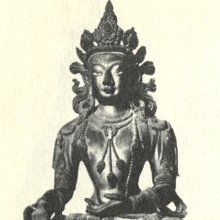Tu, Tū, Ṭu, Ṭū: 14 definitions
Introduction:
Tu means something in Hinduism, Sanskrit, Marathi, Hindi, biology, Tamil. If you want to know the exact meaning, history, etymology or English translation of this term then check out the descriptions on this page. Add your comment or reference to a book if you want to contribute to this summary article.
Images (photo gallery)
In Hinduism
Vyakarana (Sanskrit grammar)
Source: Wikisource: A dictionary of Sanskrit grammar1) Ṭu (टु).—Mute syllable टु (ṭu) prefixed to roots to signify the addition of the affix अथुच् (athuc) in the sense of verbal activity; e. g. वेपथुः, श्वयथुः (vepathuḥ, śvayathuḥ), cf. P.III. 3.89;
2) Ṭu.—The class of lingual consonants ट्, ठ्, ड्, ढ् (ṭ, ṭh, ḍ, ḍh) and ण् (ṇ); cf चुटू (cuṭū) P. I. 3.7.
--- OR ---
1) Tu (तु).—Short term (प्रत्याहार (pratyāhāra)) for the dental consonants त्, थ्, द्, ध् (t, th, d, dh) and न् (n) cf. P. I. 1.69;
2) Tu.—Personal-ending substituted for ति (ti) in the 2nd pers. imper. sing. Parasmaipada cf. P. III, 4.86;
3) Tu.—tad. affix तु (tu) in the sense of possession added in Vedic Literature to कम् (kam) and शम् (śam) e. g. क्रन्तुः, शन्तुः (krantuḥ, śantuḥ) cf. P. V. 2.138;
4) Tu.—Unadi affix तु (tu) (तुन् (tun)) prescribed by the rule सितनिगमिमसिसच्यविधाञ्कुशि-भ्यस्तुन् (sitanigamimasisacyavidhāñkuśi-bhyastun) (Unadi Sitra I.69) before which the augment इ (i) is not added e.g. सेतुः सक्तुः (setuḥ saktuḥ) etc. cf. P. VII. 2.9

Vyakarana (व्याकरण, vyākaraṇa) refers to Sanskrit grammar and represents one of the six additional sciences (vedanga) to be studied along with the Vedas. Vyakarana concerns itself with the rules of Sanskrit grammar and linguistic analysis in order to establish the correct context of words and sentences.
Biology (plants and animals)
Source: Google Books: CRC World Dictionary (Regional names)1) Tu in China is the name of a plant defined with Oryza sativa in various botanical sources. This page contains potential references in Ayurveda, modern medicine, and other folk traditions or local practices It has the synonym Oryza rubribarbis (Desv.) Steud. (among others).
2) Tu is also identified with Sonchus oleraceus It has the synonym Sonchus ciliatus Perr. ex DC. (etc.).
3) Tu in Indonesia is also identified with Alyxia rostrata It has the synonym Discalyxia rostrata Markgr. (etc.).
4) Tu in South America is also identified with Gossypium barbadense It has the synonym Hibiscus barbadensis Kuntze (etc.).
Example references for further research on medicinal uses or toxicity (see latin names for full list):
· Nova Guinea (1925)
· Candollea (1946)
· Candollea (1938)
· Flore Françoise (Lamarck) (1779)
· Acta Agric. Univ. Zhejiang. (1997)
· Blumea, Supplement (1946)
If you are looking for specific details regarding Tu, for example health benefits, extract dosage, side effects, diet and recipes, pregnancy safety, chemical composition, have a look at these references.

This sections includes definitions from the five kingdoms of living things: Animals, Plants, Fungi, Protists and Monera. It will include both the official binomial nomenclature (scientific names usually in Latin) as well as regional spellings and variants.
Languages of India and abroad
Marathi-English dictionary
Source: DDSA: The Molesworth Marathi and English Dictionarytū (तू).—pron Thou. Pr. hūṃ tara bhāṇḍīṃ ghāṃsa tū Do thou it then. Used when some unpleasant business is proposed to be done. tū mī karaṇēṃ To thee and thou. Also tū mī vara yēṇēṃ Pr. kēlēṃ tukāṃ jhālēṃ mākāṃ or tūsa karāyālā gēlēṃ tara masa kasēṃ ālēṃ Evil designed for thee is fallen upon myself.
Marathi is an Indo-European language having over 70 million native speakers people in (predominantly) Maharashtra India. Marathi, like many other Indo-Aryan languages, evolved from early forms of Prakrit, which itself is a subset of Sanskrit, one of the most ancient languages of the world.
Sanskrit dictionary
Source: DDSA: The practical Sanskrit-English dictionaryṬu (टु).—
1) Gold.
2) One who can change his shape at will.
3) Name of the god of love.
Derivable forms: ṭuḥ (टुः).
--- OR ---
Tu (तु).—2 P. (tauti and tavīti)
1) To have authority or power, to be strong; स तूताव नैनमश्नोत्यंहतिः (sa tūtāva nainamaśnotyaṃhatiḥ) Ṛgveda 1.94.2.
2) To get, attain.
3) To thrive, increase, become full.
4) To go, move.
5) To injure, hurt, strike.
--- OR ---
Tu (तु).—ind. (Never used at the beginning of a sentenece, but usually after the first word)
1) An adversative particle meaning 'but', 'on the contrary', 'on the other hand', 'nevertheless'; स सर्वेषां सुखानामन्त ययौ । एकं तु सुतमुखदर्शनसुखं न लेभे (sa sarveṣāṃ sukhānāmanta yayau | ekaṃ tu sutamukhadarśanasukhaṃ na lebhe)K.59; विपर्यये तु पितुरस्याः समीपनयन- मवस्थितमेव (viparyaye tu piturasyāḥ samīpanayana- mavasthitameva) Ś.5. (in this sense tu is often added to kiṃ and param, and kiṃtu and paraṃtu are, unlike tu, always used at the beginning of a sentence).
2) And now, on one's part, and; एकदा तु प्रतीहारी समुपसृत्याब्रवीत् (ekadā tu pratīhārī samupasṛtyābravīt) Kathāsaritsāgara 8; राजा तु तामार्यां श्रुत्वाऽब्रवीत् (rājā tu tāmāryāṃ śrutvā'bravīt) 12.
3) As to as regards, as for; प्रवर्त्यतां ब्राह्मणानुद्दिश्य पाकः ।, चन्द्रोपरागं प्रति तु केनापि विप्र- लब्धासि (pravartyatāṃ brāhmaṇānuddiśya pākaḥ |, candroparāgaṃ prati tu kenāpi vipra- labdhāsi) Mu.1; Mālatīmādhava (Bombay) 8.4.
4) It sometimes marks a difference (bheda) or superior quality; मृष्टं पयो मृष्टतरं तु दुग्धम् (mṛṣṭaṃ payo mṛṣṭataraṃ tu dugdham) G. M.
5) Sometimes it is used as an emphatic particle; बालानां तु शुभं वाक्यं ग्राह्यम् (bālānāṃ tu śubhaṃ vākyaṃ grāhyam) Rām.7.83.2. भीमस्तु पाण्डवानां रौद्रः (bhīmastu pāṇḍavānāṃ raudraḥ) G. M.
6) And sometimes it is used as a mere expletive; निरर्थकं तु हीत्यादि पूरणैकप्रयोजनम् (nirarthakaṃ tu hītyādi pūraṇaikaprayojanam) Chandr. 2.6.
7) when used as an indeclinable it means, 'undoubtedly'; तुशब्दः संशयव्यावत्त्यर्थः । न खलु संशयोऽस्ति (tuśabdaḥ saṃśayavyāvattyarthaḥ | na khalu saṃśayo'sti) | ŚB. on MS.1.3.74.
Source: Cologne Digital Sanskrit Dictionaries: Edgerton Buddhist Hybrid Sanskrit DictionaryTu (तु).—but, recorded at the beginning of a sentence: tu tava vijite catvāraḥ prāṇinaḥ…Mūla-Sarvāstivāda-Vinaya iii.130.1. Unless some word has been lost or transposed, no other inter- pretation seems possible.
Source: Cologne Digital Sanskrit Dictionaries: Shabda-Sagara Sanskrit-English DictionaryṬu (टु).—m.
(-ṭuḥ) 1. Gold. 2. A Proteus, a changer of shapes at will, Kama or love.
--- OR ---
Tu (तु).—r. 2nd cl. (tauti or tavati) 1. To go or move. 2. To thrive or increase. 3. To injure, to hurt or kill. 4. To become full. According to some authorities this is merely a Sautra root. vṛttau, vṛddhau aka0 hiṃsāyāṃ jetari saka0 adā0 pa0 aniṭ .
--- OR ---
Tu (तु).—ind. A particle, implying. 1. Difference, (but, or.) 2. Disjunction, (but, again, further, other.) 3. Connection, (and, moreover.) 4. Asseveration, (indeed.) 4. An explective. E. tud-ḍu .
Source: Cologne Digital Sanskrit Dictionaries: Benfey Sanskrit-English DictionaryTu (तु).—ii. 2, [Parasmaipada.] 1. To be powerful (ved.). 2. † To increase. 3. † To go. 4. † To hurt.
— Cf. [Latin] tumor, tumere, tumulus, tuber, tueri, totus; [Gothic.] thiuda, thiuth, thiuthjan; A. S. theod, people.
--- OR ---
Tu (तु).—a particle (akin to tva, a ved. pron., Some, one, another, etc.). 1. But, [Mānavadharmaśāstra] 1, 109. 2. Preceded by api, But rather, [Daśakumāracarita] in
— tu, Indeed
— but, [Hitopadeśa] i. [distich] 32. 6. Often without a special signification, [Mānavadharmaśāstra] 7, 95. 7. Sometimes erroneously for nu, [Brāhmaṇavilāpa] 3, 17 (where the Calc. ed. has nu).
— Cf. perhaps
Source: Cologne Digital Sanskrit Dictionaries: Cappeller Sanskrit-English DictionaryTu (तु).—1. tavīti be strong.
--- OR ---
Tu (तु).—2. (tū) ([indeclinable]) pray, do ([with] imperat.); but, on the contrary (±eva or vai); often only explet.
— kiṃ tu & paraṃ tu yet, however ([especially] after a concess. sent.); na tu yet not, rather than ([especially] after kāmam, bhūyas, varam etc.). tu—tu on the one hand — on the other, indeed — but.
Source: Cologne Digital Sanskrit Dictionaries: Monier-Williams Sanskrit-English Dictionary1) Ṭu (टु):—m. gold, [cf. Lexicographers, esp. such as amarasiṃha, halāyudha, hemacandra, etc.]
2) one who changes his shape at will, [Horace H. Wilson]
3) love, god of love, [Horace H. Wilson]
4) Tu (तु):—1. tu [class] 2. (tauti, [Dhātupāṭha]; [future] 2nd totā or tavitā, [Vopadeva]) to have authority, be strong, [Ṛg-veda i, 94, 2] ([perfect tense] tūtāva cf. [Naighaṇṭuka, commented on by Yāska iv, 1; Pāṇini 6-1, 7; Kāśikā-vṛtti]);
—to go, [Dhātupāṭha];
—to injure, [ib.] :—[Causal] ([Aorist] tūtot, 2. sg. tos) to make strong or efficient, [Ṛg-veda ii, 20, 5; vi, 26, 4];—cf. ut-, saṃ-;—tavas, etc., tīvra;
5) [Zend] tav, ‘to be able’; [Latin] tumour, tueri, totus.
6) 2. tu ind. (never found at the beginning of a sentence or verse; metrically also tū, [Ṛg-veda]; cf. [Pāṇini 6-3, 133]) pray! I beg, do, now, then[, [Latin]] dum used ([especially] with the Imper.), [Ṛg-veda]
7) but (also with eva or vai following), [Atharva-veda iv, 18, 6; Taittirīya-saṃhitā; Śatapatha-brāhmaṇa] etc.
8) and, [Manu-smṛti ii, 22]
9) or, [i, 68; xi, 202]
10) often incorrectly written for nu, [Mahābhārata (i, 6151 [Bombay edition] and [Calcutta edition]) ]
11) sometimes used as a mere expletive
12) [ca -na tu] though — still not
13) [na -api tu] not — but
14) [na ca -api tu] not — but
15) [kāmaṃ -tu] though — still
16) [kāmaṃ ca -tu] though — still
17) kiṃ tu though — still
18) paraṃ tu though — still
19) [kāmaṃ -na tu] it is true — but not, ere than
20) [bhūyas -na tu] it is true — but not, ere — than
21) [varam -na tu] it is true — but not, ere than
22) kiṃ tu still, nevertheless
23) [na -paraṃ tu] not — however
24) [tu -tu] certainly — but, [Hitopadeśa i, 2, 33.]
Source: Cologne Digital Sanskrit Dictionaries: Yates Sanskrit-English Dictionary1) Ṭu (टु):—(ṭuḥ) 2. m. Gold; a Proteus, or shape-changer; Kāma, or love.
2) Tu (तु):—tauti [(la)] 2. a. To go; to thrive; to hurt; to become full.
3) conj. But, and, or, yet, indeed.
[Sanskrit to German]
Sanskrit, also spelled संस्कृतम् (saṃskṛtam), is an ancient language of India commonly seen as the grandmother of the Indo-European language family (even English!). Closely allied with Prakrit and Pali, Sanskrit is more exhaustive in both grammar and terms and has the most extensive collection of literature in the world, greatly surpassing its sister-languages Greek and Latin.
Hindi dictionary
Source: DDSA: A practical Hindi-English dictionaryTū (तू):—(pro) thou; you; -[tū maiṃ-maiṃ] lowlevel altercation, squabbling; -[taḍāka] boorish/uncivil language; •[para utara ānā] to stoop to boorish/uncivil language; —[merī ḍaphalī bajā maiṃ terā rāga alāpūṃ] claw me and I'll claw thee.
...
Kannada-English dictionary
Source: Alar: Kannada-English corpusTū (ತೂ):—
1) [noun] the sound made while spitting saliva.
2) [noun] a sound imitating it expressing one’s disgust, anger, scorn or contempt, etc.
3) [noun] ತೂ ಅನ್ನು [tu annu] tū annu to regard with scorn; to treat contemptuously; to condemn; ತೂ ಛೀ ಅನ್ನು [tu chi annu] tū chī annu = ತೂ ಅನ್ನು [tu annu]; ತೂ ಮಾಡು [tu madu] tū māḍu (children’s term) to throw out what is being chewed; to spit.
Kannada is a Dravidian language (as opposed to the Indo-European language family) mainly spoken in the southwestern region of India.
See also (Relevant definitions)
Starts with (+4122): Tilakapraya, Tiluvalikaste, Tisuli, Tu ba ri, Tu bai bu, Tu bei mu, Tu bi, Tu chi li, Tu chin, Tu chuan, Tu chuung, Tu da huan, Tu ding gui, Tu er san, Tu fu ling, Tu gang gui, Tu heng, Tu huo, Tu hus bieern, Tu hus gai.
Ends with (+9557): A-karaipatuttu, A-potaikkappotu, A-puccikattu, Aarnatu, Abadukattu, Abbhutthettu, Abdhatu, Abhicaritu, Abhicharitu, Abhihattu, Abhijanitu, Abhijittu, Abhijitu, Abhijnaketu, Abhikratu, Abhimantu, Abhiprastu, Abhisamstu, Abhisastu, Abhishtu.
Full-text (+2312): Pravacanapatu, Katu, Kriyapatu, Vakpatu, Mayapatu, Apatu, Salatu, Vacoyuktipatu, Bahupatu, Catu, Tum, Yatu, Patu, Karkaretu, Karkatu, Otu, Jivatu, Karkaratu, Vanatu, Sharatu.
Relevant text
One of your search terms exceeds the minimun character amount per search term. This amount currently equals 2.
No search results for Tu, Tū, Ṭu, Ṭū in any book or story.





